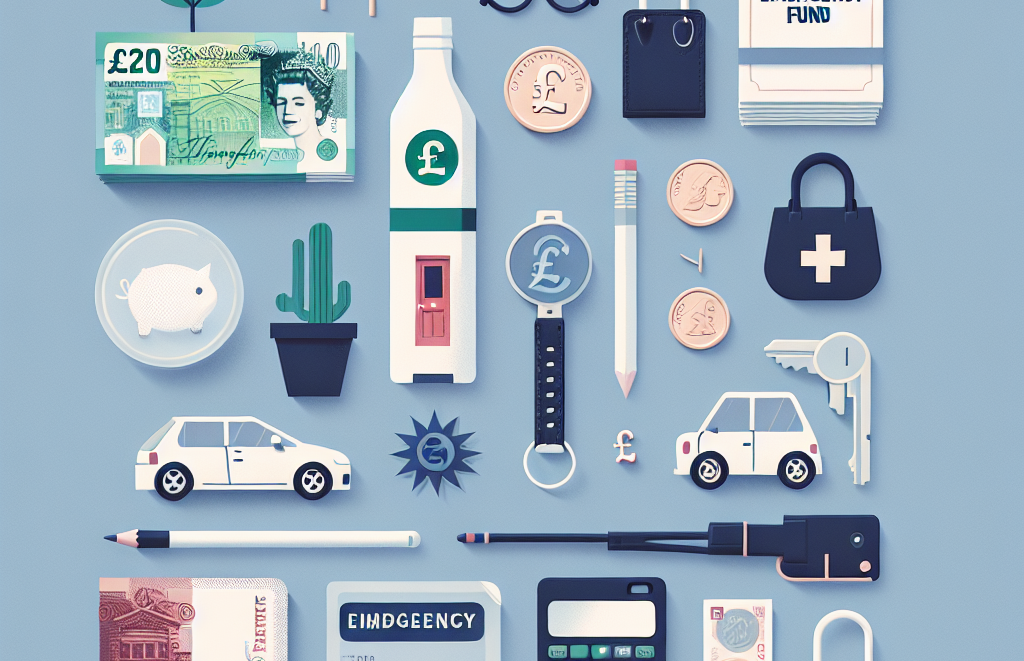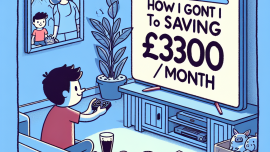
£100 Emergency Fund: The First Step to Feeling Grown-Up About Money
What is a Budget (and Why It’s Not a Dirty Word)
Alright, let’s get something straight from the get-go: the word “budget” is not a sentence to a sad, joyless life where you never go out and only eat beans. In fact, budgeting is more about empowering your money than restricting your freedom. It’s like giving your cash a job — and if you’re not the boss of your money, someone else (hello, credit card interest) will be.
Hi, I’m Tom, and I’ve made every beginner financial mistake in the book. That’s why I’m here to help you avoid the potholes I fell into with plain talk, zero judgment, and maybe a dad joke or two along the way.
So, What Is a Budget?
At its core, a budget is a plan for how you spend and save your money each month. That’s it. Nothing scary. It’s just a way to track your income and decide where your money goes — instead of wondering where it went.
In other words: your budget is you telling your money what to do, rather than letting it vanish every time you scroll past an online sale that says “limited time only.”
Why You Need a Budget (Even If You Think You’re Fine Without One)
If you’re thinking, “I don’t need a budget, I’m not broke,” let me stop you right there. A budget isn’t just for people struggling to pay rent — it’s for anyone who wants to take control of their financial future.
Here’s why making a budget is one of the smartest moves you can make, no matter your income level:
- It helps you avoid overspending. Ever checked your bank account mid-month and wondered how it got that… empty?
- You can plan for big goals — whether that’s buying a house, traveling to Italy, or simply building a rainy-day fund.
- Reduces stress. Money anxiety is real. Knowing your numbers gives you peace of mind.
- Makes your money work for you. Even a small budget can open up opportunities to save or invest smartly.
Bottom line: Everyone can benefit from budgeting. Trust me, future-you will high-five present-you for doing it.
The Building Blocks of a Budget
1. Know Your Income
This is the money that actually lands in your account after taxes — a.k.a. your net income. If you’re working a day job with a regular paycheck, this should be fairly easy to figure out. If you gig, freelance, or rely on tips, take an average of the past few months to estimate.
2. Track Your Expenses
You can’t fix what you don’t measure. So, list out everything you spend money on — rent, food, streaming services, midnight tacos, you name it. Break your expenses into two buckets:
- Fixed expenses: These stay the same each month (rent, car payment, subscriptions).
- Variable expenses: These change month to month (groceries, entertainment, gas).
3. Set Financial Goals
Think short term (buying a used car) and long term (retirement? Yeah, we said it). Assign dollar amounts to these goals and include them in your monthly budget. Saving is easier when there’s a real-life reason behind it.
4. Create Your Budget By Category
Now that you’ve got your money picture, it’s time to assign limits. Decide how much you’re going to spend in each area. You can use the popular 50/30/20 rule as a starting point:
- 50% of your income goes to needs (rent, bills, groceries)
- 30% goes to wants (dinners out, Netflix, fun stuff)
- 20% goes to savings or debt repayment
This isn’t set in stone. Customize based on your lifestyle (and how far you want to go with those financial goals).
Common Budgeting Methods for Beginners
1. Zero-Based Budgeting
This method gives every dollar a job. At the end of the budget, you should have zero dollars “unassigned” — not because they’re gone, but because you have a plan for every one of them. Great if you want maximum control.
2. Envelope System (Yes, Even Digital Ones)
With this system, you split your money into categories (“envelopes”) and stop spending once the envelope is empty. There are plenty of apps now that mimic this strategy without needing actual paper (no offense to envelopes everywhere).
3. Pay Yourself First
Instead of saving what’s left over (which, let’s be honest, is usually nothing), you save first and live off what’s left. Automate your savings = autopilot toward your goals.
Tips to Stick to Your Budget Without Hating Life
- Be real. Don’t try to quit all spending cold turkey. Budget like a human, not like a monk.
- Use budgeting apps, like Mint, YNAB, or Goodbudget. Let the robots help.
- Review regularly. Your budget isn’t a “set it and forget it” deal. Check in weekly or monthly and adjust.
- Celebrate small wins. Paid off a small debt? Saved an emergency fund? Dance it out.
What If You Bust Your Budget?
First of all, don’t beat yourself up. Budgeting is a skill — and skills get better with practice. If you overspent one month, look at where things went off the rails, adjust, and try again. Progress over perfection, always.
The Bottom Line
Budgeting isn’t about punishment — it’s about freedom. Financial freedom. Mental freedom. The freedom to say “Yes” when your friends plan a weekend getaway, or to sleep better knowing your bills and savings are taken care of.
So start today, even if it’s messy. Even if you get it “wrong.” Because taking control of your money? That’s one of the most powerful things you’ll ever do.
Need more help or have questions? Feel free to contact us here, or learn more about who we are and what we do.
— Tom B.









Leave a Reply